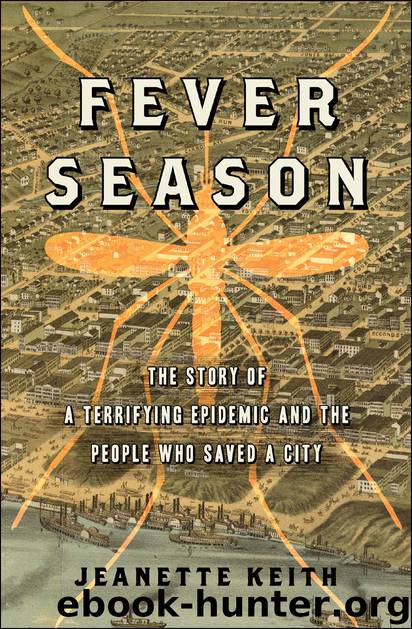Fever Season by Jeanette Keith

Author:Jeanette Keith
Language: eng
Format: epub
Publisher: Bloomsbury Publishing Plc
Published: 2012-06-16T04:00:00+00:00
Six
A Contagion of Kindness
How bad were things in memphis? According to a physician just returned from the city, fever-stricken white women were being raped by their black male nurses, even as they lay dying.
In the second week of September, Dr. William T. Ramsey gave an interview to the Washington Post in which he described Memphis in the most lurid terms. According to Ramsey, you could smell the stench of Memphis from five miles out. “No words can describe the filth I saw, the rotten wood pavements, the dead animals, putrifying human bodies and the half-buried dead combining to make the atmosphere something dreadful.” He described nurses, men and women, smoking cigars to mask the smell of their patients. The Peabody Hotel was a “perfect pesthouse,” with two thirds of the rooms occupied by yellow fever victims and sulfur pans burning in the halls to keep down infection. Poor whites and blacks from 150 miles around had come to Memphis seeking food, Ramsey said. “Hundreds of them prowl around the streets with hardly any clothes on.” He added, “They break into the vacant houses whenever they want.” The city was in the hands of its black policemen, who behaved well.
But according to Ramsey, Memphis was so short of nurses “that the best a white woman can do is to have a male negro nurse; and strange as it may seem, I was authentically informed that these negro nurses will take advantage of their helpless white victims, even while they are in the agonies of death.” This inflammatory statement appeared in the morning Washington Post on September 13. Before the day was over, John Keating had received a telegram from Washington begging him to deny the slander.
Keating immediately telegraphed the Post that the story was “untrue, every word of it.” In the first place, he said, white women did not have to employ black male nurses. There were no rapes. Had any man, black or white, done such a thing, he would not have been “allowed to breathe” after the crime became known. The statement was a “gross libel” on Memphis blacks. Keating wrote, “All honor to them; they have done their duty. They have acted by us nobly as policemen and soldiers, as well as nurses. They have responded to every call made upon them in proportion to their numbers quite as promptly as the whites. The colored citizens of Memphis, as a body, deserve well of their white fellow-citizens. We appreciate and are proud of them.”
Keating repeated his answer to the Post on the front page of the September 14 Appeal, adding, “Looking back across the gloomy vista of the past five weeks, and recalling all that we have passed through, how near to anarchy we have been several times, we are thankful that the negroes, forming as they do just now the great bulk of our population, have manifested a patience worthy of all praise.” After the epidemic ended, he wrote about the rape accusation: “No charge ever made was so baseless, so wanton, so cruel, so unjust.
Download
This site does not store any files on its server. We only index and link to content provided by other sites. Please contact the content providers to delete copyright contents if any and email us, we'll remove relevant links or contents immediately.
| Africa | Americas |
| Arctic & Antarctica | Asia |
| Australia & Oceania | Europe |
| Middle East | Russia |
| United States | World |
| Ancient Civilizations | Military |
| Historical Study & Educational Resources |
Cat's cradle by Kurt Vonnegut(15338)
Pimp by Iceberg Slim(14488)
4 3 2 1: A Novel by Paul Auster(12375)
Underground: A Human History of the Worlds Beneath Our Feet by Will Hunt(12090)
The Radium Girls by Kate Moore(12018)
Wiseguy by Nicholas Pileggi(5770)
The Fire Next Time by James Baldwin(5431)
Perfect Rhythm by Jae(5398)
American History Stories, Volume III (Yesterday's Classics) by Pratt Mara L(5301)
Paper Towns by Green John(5179)
Pale Blue Dot by Carl Sagan(4996)
A Higher Loyalty: Truth, Lies, and Leadership by James Comey(4954)
The Mayflower and the Pilgrims' New World by Nathaniel Philbrick(4495)
The Doomsday Machine by Daniel Ellsberg(4484)
Killers of the Flower Moon: The Osage Murders and the Birth of the FBI by David Grann(4435)
The Sympathizer by Viet Thanh Nguyen(4385)
Too Much and Not the Mood by Durga Chew-Bose(4338)
The Borden Murders by Sarah Miller(4313)
Sticky Fingers by Joe Hagan(4188)
